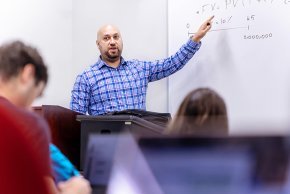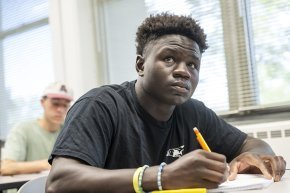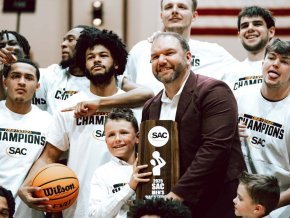
The business of accreditation
The Lenoir-Rhyne University College of Business and Economics kicked off 2025 with excellent news – the Accreditation Council for Business Schools and Programs (ACBSP) has renewed the college’s accreditation through 2035.

“We hit all our goals for full accreditation,” said Craig Schreiber, Ph.D., professor of management and dean of the College of Business and Economics. “This means we are delivering a high-quality education that aligns with current industry expectations. Our program develops students who successfully deliver for their employers.”
Q: What does it mean for an institution to be accredited?
Accreditation for any educational institution is a review process in which the accrediting body sets forth educational and/or professional standards. Members of the accrediting body evaluate how the institution is meeting those standards by looking at materials submitted by the institution, conducting site visits and interacting with faculty, students and other stakeholders. Some accrediting bodies are government-affiliated and others, like ACBSP, are purely professional.
“The details for accreditation vary between professional programs, but the bottom line is quality assurance,” explained Loury Floyd, Ph.D., assistant provost for academic operations. “Each accrediting body has its own standards they use to govern their profession, and accreditation ensures that every student of an accredited institution graduates with a specific set of knowledge and skills that align with the demands of the field or industry.”
Q: What does the ACBSP accreditation process look like?
ACBSP evaluates and accredits programs from community colleges through graduate schools around the globe. The process addresses seven standards – leadership, strategic planning, student and stakeholder focus, student learning assessment, faculty focus, curriculum, business unit performance. The College of Business and Economics set its own goals with measurable outcomes addressing each of these standards. The faculty then gathered evidence and data to demonstrate achievement of these goals.

“If you follow the process as intended – which we do – it’s a continuous cycle of reflection and improvement. We submitted a 170-page report plus pieces of evidence and data, but that was the result of ongoing self-evaluation. We gather information every semester, which makes the process easier and more effective,” shared Jamie Conrad Strom, DBA, associate professor of business. “The faculty are fully invested in the process because it’s an investment in a culture of continuous quality improvement and an opportunity to deliver the best career preparation for our students. We learn new things by digging into the details of our instructional practices.”
Q: Why does the College of Business and Economics need a separate accreditation from the university as a whole?
“Other programs that are associated with licensure – such as nursing or education – are required by law to have their own accreditation in addition to the university’s overarching accreditation. Our accreditation with ACBSP is a voluntary process that we engage with to provide the highest level of quality assurance for our graduates and for the companies that hire them,” said Strom. “It’s all about continuous improvement and adaptability to changes in the landscape of higher education and in the demands of the job market. As a faculty, this process enables us to keep growing and striving to be better.”
Q: According to ACBSP, what does the College of Business and Economics do really well?
“Overall, we are committed to a compelling vision,” said Schreiber. “Our faculty want to produce stellar graduates ready for exceptional experiences beyond Lenoir-Rhyne. We received multiple commendations for our strategic planning, teaching excellence, recruiting and retention with growth in enrollment after COVID, updating and refreshing our programs to align with industry standards, and our strong relationships with stakeholders on campus and within the community. Our students are committed to their own progress. Our board of advisors and area businesses and industries are engaged with everything we do here.”

Q: How does connection to ACBSP benefit Lenoir-Rhyne students?
“Accreditation is important, of course, but our relationship with ACBSP provides students with much more,” Schreiber explained. “Our affiliation with this organization gives our students and faculty countless opportunities to network and collaborate with their peers on an international scale through resources, symposia and conferences. For example, our entrepreneurship students will be participating in a global pitch competition through ACBSP later this year, which will be a phenomenal experience for them. For chairs, deans and directors, ACBSP hosts special symposiums to develop leadership. Plus there are weekly podcasts and webcasts. They host a biannual women's leadership conference. So access to the network of resources is just tremendous. We’re all here to help each other and make each other better.”

Lenoir-Rhyne University has announced that Brent Owen has signed a new three-year contract extension to remain as head men’s basketball coach through April 2028.
View More
Thank you to the 1,469 donors who made Bears Give Back 2025 a success, raising $695,472 to support Lenoir-Rhyne University programs and students. Your generosity strengthens our community and fuels our future.
View More